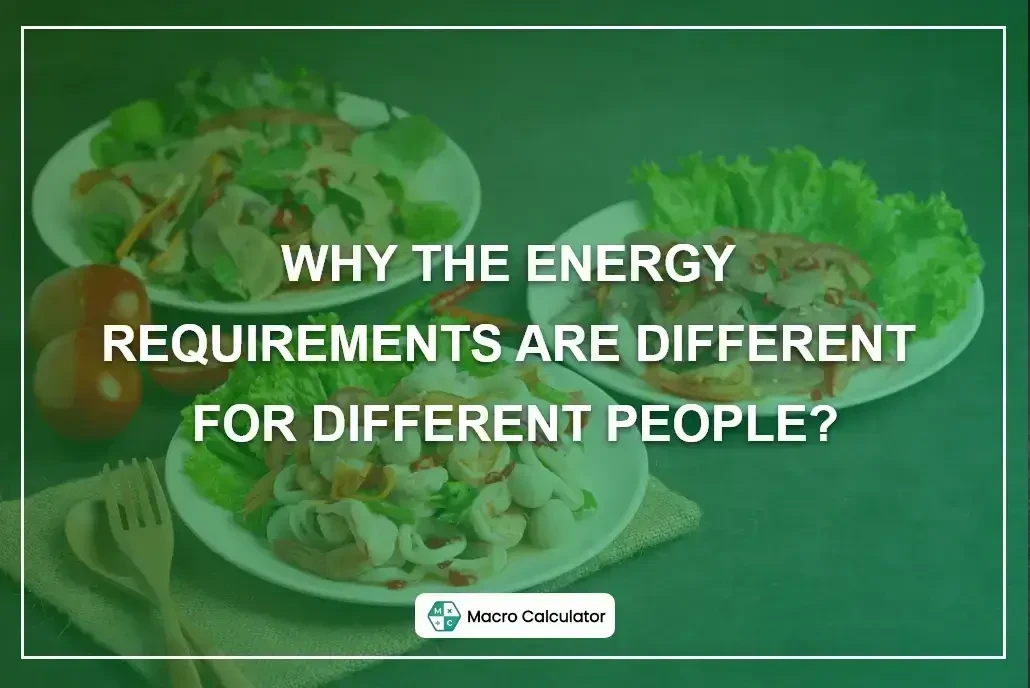 July 02, 2021
July 02, 2021
Energy is an essential element for humans because it keeps us moving in the world.
Energy keeps us alive, helps us grow, and keeps us warm under severe external conditions.
The standard sources for humans to gain energy include foods and drinks. Things like carbohydrates, fats, proteins, and other kinds of nutrients are major sources of energy for the body.
But the interesting thing is, the energy requirements differ from person to person. The amount of energy that individuals need to perform at their best depends on their specific daily routine and the energy needs that come with it.
The question is, what causes this drastic change in energy requirements for individuals?
Learning about this can give us massive insights about managing the way we utilize our energy to make the most out of it.
Here are some of the most common factors that are the reason why energy requirements are different for different people
The amount of energy consumed and utilized differs a lot between men and women. For example, women generally have a higher proportion of body fat as compared with men. Women consume less energy and when they work out and they burn fat at a slightly higher rate.
Men on average, consume way more energy than a woman because there a greater number of men that have to go through some form of intense physical activity on a daily basis.
These insights show that the energy requirements differ a lot because of gender. Of course, there are exceptional cases out there. But if you look at it objectively, men require a greater intake of energy daily to stay active and perform at their best.
Although the energy requirements shift based on some other factors like pregnancy for Women and old age for men. It is recommended that you consult a health specialist about your specific needs for energy intake.
Body size, weight, and composition are important factors that can determine the energy intake and utilization for individuals.
Health specialists all over the world use body size and weight to determine rest energy expenditure. If you have more weight, you are going to have higher energy requirements for the effective functioning of your metabolism.
This is because the maintenance cost of the body for people who are overweight is a lot more than average. You need to manage your weight if you want to cut down your need for energy consumption.
The best way to do that is a controlled diet plan. An effective diet plan and workout routine can help you maintain your weight and thus your energy consumption and utilization ratios.
If you are looking for a diet for weight loss, you can use the Macro Calculator to create a specific diet plan for yourself.
Once you have a diet plan for yourself, you need to stick to it along with regular exercise to lose weight.
Your body is always utilizing energy even when it is in the rest state. There are many chemical reactions going on inside your body that need the energy to work. The amount of energy being used when your body is in a rest state is known as the Resting Energy Expenditure.
Now, when you perform physical activity, the energy expenditure rises than its average when the body is in the rest state. This expenditure of energy varies depending on the physical activity that is being performed.
So, physical activity has a massive impact on energy requirements for the body.
People who engage in intense physical activity on a daily need to meet the daily energy requirements. They need to keep in mind the difference, duration, intensity, and frequency of physical activity to calculate the amount of energy that they are going to need.
Research shows that for healthy individuals, the energy requirements decrease with age. This is because as we get older, the lean body tissues of our body decrease and there is an increase in the fat tissues.
This translates to the simple fact that older people have a greater amount of fat as compared with muscle. This affects the base metabolic rate (BMR) which has an impact on the average energy requirement for adults.
So, when it comes to figuring out the energy requirements for individuals, age is an important factor that you just can’t dismiss.
This is the reason why there are different dietary requirements for different individuals. You can consult a dietitian to find out what would be the best diet plan for your age.
This is important if you want to make sure that you make the most amount of energy that’s available to you.
Research shows that the kind of environment that an individual lives in also has a great impact on their energy expenditure.
For example, people living in intense conditions require more energy intake to survive and their energy expenditure values are way higher than people who live in areas with stable environmental conditions that are not harsh by an individual’s standard who is living in the intensely cold climate.
Climactic conditions don’t affect energy consumption and expenditure to a huge extent. But still, the effects that they do have are not something that you can just dismiss.
Learning about the impact of climate on energy requirements can help individuals moving to a new environment make changes to their energy intake to best meet the conditions of the new place.
The key takeaway here is, energy requirements vary widely from a person to person because of a lot of factors.
You need to keep all these factors in mind and base your dietary & workout plans according to that to meet your specific energy requirements.
You need the energy to grow and move around in this world. So, you need to make sure that you know how it works and the factors that affect it. Knowing that will help you manage your energy needs in the most effective way.